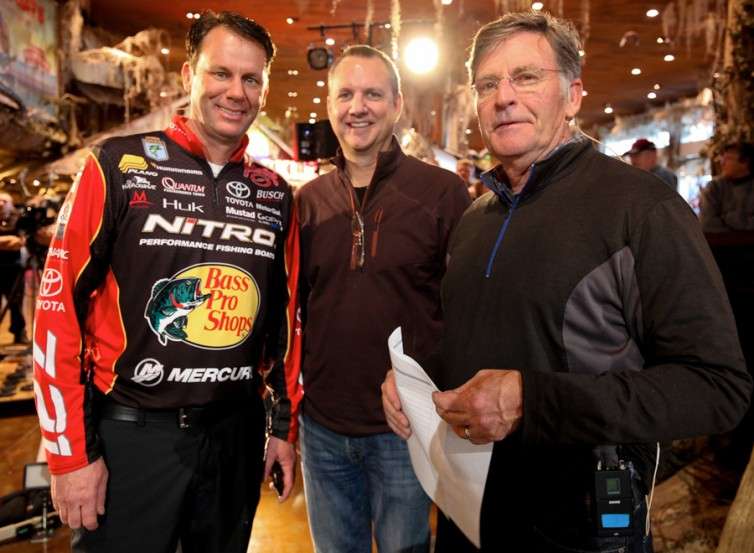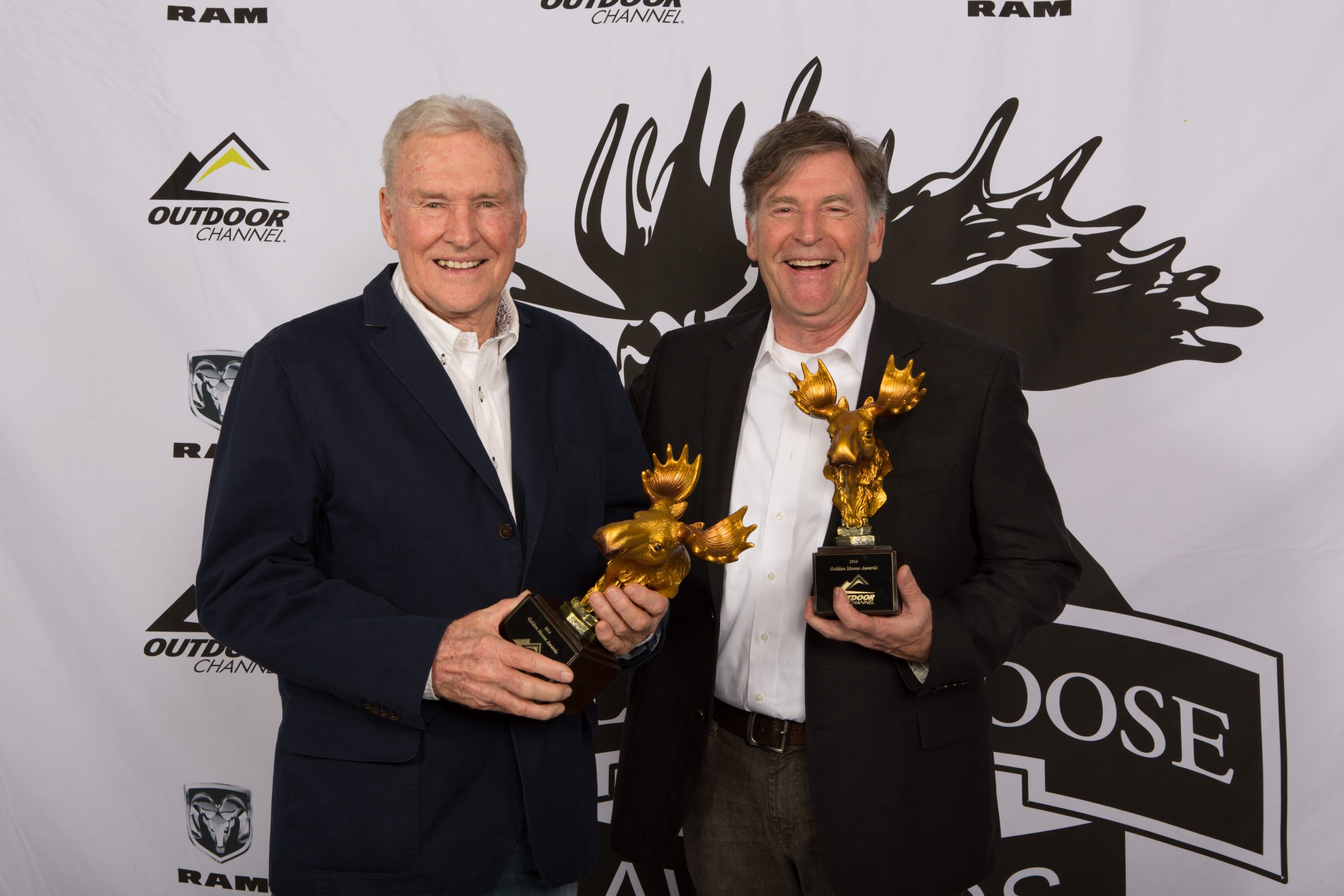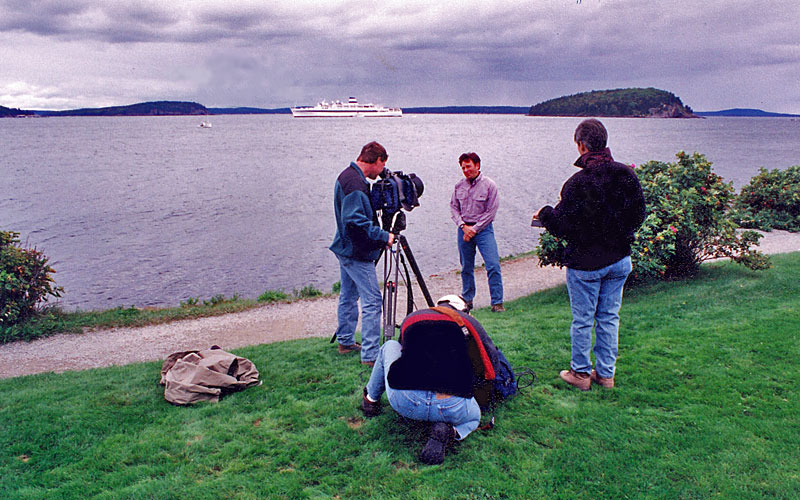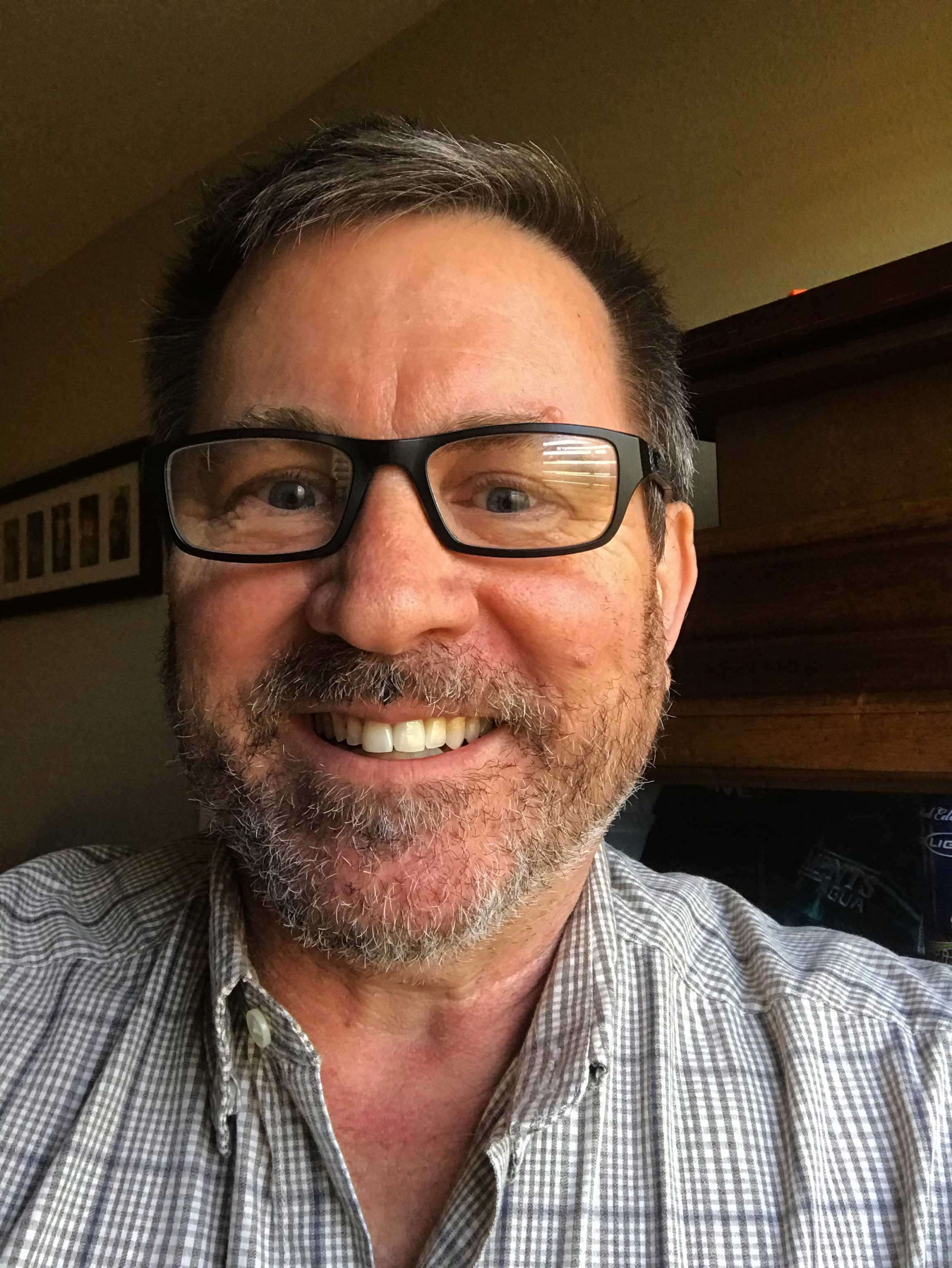
Now you see him, now you really don’t. Tommy Sanders has graced the airwaves for more than a quarter century, but it’s never been about him.
Only those in his inner circle really know him, and they say Sanders is a consummate broadcast professional, a genial, humble performer whose workingman-like approach makes their jobs easier.
“I’ve always said he’s our greatest asset,” B.A.S.S. co-owner Jerry McKinnis said, “and he’s also the most overlooked.”
Sanders serves as the face of Bassmasters TV, but he knows it’s his job to present the shield and step out of the way, not attract attention to himself.
“He’s fantastic at it,” McKinnis said. “The perfect guy in his position is someone that after he’s done, you don’t even remember him being on.
“It’s almost like you’ve done a really great job if they don’t even know you showed up. That’s almost kind of an insult. Tommy’s great at disappearing, but that’s what that guy is supposed to do, make that other guy the star.”
Co-host Mark Zona appreciates that fact. As color man, Zona provides the how, where and what tournaments were won on, and Sanders’ directs him to all those stops.
“Tommy is the bus driver of The Bassmasters,” Zona said. “He always has been, always will be, and is the best at it. He’s the Al Michaels of The Bassmasters. He could literally leave The Bassmasters tomorrow and do Monday Night Football.”
B.A.S.S. emcee Dave Mercer has similar respect for Sanders. He’s amazed at his smooth cadence, quick-draw accuracy and clarity.
“I think he inspired the Most Interesting Man Alive,” Mercer said. “I think the Most Interesting Man Alive has a poster of Tommy Sanders on his wall.”
Sanders shrugs his talents off as some sort of parlor trick, but his ability to digest details of people, places and events then relay them coherently on cue seems more like magic. Others in the field he enjoys include Al Michaels, Cris Collinsworth, Johnny Miller and Gary McCord, as they exhibit what he thinks makes a good broadcaster.
“People who are committed to it,” he said. “You know it’s not their whole life, but you know when they sit down in front of the microphone, they’re committed. They’re into the story and they’re just as big a fan as you are.
“They don’t try to be on an echelon above you and talk down to you, they’re on your level. They’re sitting next to you eating popcorn watching the thing, but bringing intelligent information constantly.”
Sanders has hit his mark in doling out tons of kernels for a variety of audiences since joining JM Associates in 1990. Starting with the wraparound segments for the ESPN Outdoors block, to hosting Stihl Timbersports, the Great Outdoor Games and The Bassmasters among others, Sanders has delivered the goods.
High performance, low maintenance
Sanders is as low maintenance a TV talent as there is. In the corner of JM’s 7,200-square-foot studio, Sanders sits at a small folding table, with his laptop, a lamp, a stack of periodicals and notes, a telephone and a microphone.
It’s there at his computer, just a few steps away from action on The Bassmasters, that his magic act begins. Producer Mike McKinnis said there are two types of talent, the difficult one being a stuffed shirt.
“They don’t know the sport and you have to walk them through it. As producer/director, you spend all your time hand-holding,” he said. “The easy way is going into your project knowing talent is the last thing you need to think about. With Tommy Sanders there, I know that the information is solid, better than what I have.”
A recent example is a first-time project for JM, the Super Boat races from Key West. Sanders teamed with expert Stan Lane on the broadcast crew.
“He didn’t know anything about it, he did his research, dug in and came with all his notes and he was great,” Mike McKinnis said. “Going into a new project and having him there just makes you feel that part is going to be easy.”
Jerry McKinnis confirms that Sanders has always been a fastidious researcher, and he can’t wait to see the boat race show.
“I’m going to think, my gosh, I didn’t know Sanders boat races that much,” he said.
Zona recalled his first time working in studio with Sanders. It was for the 2005 Bassmaster event won by Zell Rowland, and Mike McKinnis asked Sanders for a one-minute, 24-second opening on Lake Guntersville.
“He does something with his mouth, where he mouths it without talking, and I’m staring at him,” Zona said. “I’m a nervous wreck as it is, and he looks at Mike and says, ‘OK, I’m ready.’
“Three, two, one – and it was the most fluid, gracious, perfection I had ever seen in my life – he missed it by one second. I thought to myself, ‘Wow, am I screwed.’ That is no joke. I was stunned.”
Jerry McKinnis said he felt the same way when he shot shows with Sanders.
“It used to be intimidating to me,” he said. “He’d do a perfect job and do all the names right, the times and the setup, and in my first three lines, I blow it, and we have to start all over. He’s got to go through that again. That was always intimidating.”
Jerry McKinnis is pleased with the announcing team at B.A.S.S., whether on the ESPN2 shows or Bassmaster.com work like “Bassmaster Live,” “The Livewell” or “Hooked Up.” Many say the team of Sanders and Zona could fare well announcing any sport.
“It is a perfect pair,” Jerry McKinnis said. “Quite honestly, Zona’s part is kinda easy, because he’s talking about what he knows. Then he’s very free to be an idiot. And he can make mistakes, and just go on, back up. Tommy has to be perfect. He can’t make mistakes. He’s the professional and he has to be right on, and he is, he doesn’t make mistakes.”
Humble is often used to describe Sanders. He disputes Jerry by saying his part is easy, and Zona’s great analysis carries the load. With most broadcasters seeking fame, it’s unusual that Sanders is content to deflect the limelight.
“Today, there are not a lot of those guys,” Jerry McKinnis said. “Their egos won’t let that happen. I’ve always said Tommy has one problem – he has no ego whatsoever.”
At a tournament when the crew was breaking down the stage, people walking by were amazed that Sanders was elbow to elbow with stagehands, stacking chairs, rolling cable. “There’s no way he’d walk away with everybody else working,” Jerry McKinnis said.
Why no ego, Mr. Sanders?
“I don’t know. I’m a natural worrier,” he said. “I want to appear like I’m onboard all the time. I don’t want to appear aloof or think I’m better than anybody else, because I’m not.
“My ability is just like a parlor trick or a trait, being able to stand in front of a camera and talk. It’s not like I hold the formula to curing cancer or anything.”
Sanders has turned those tricks into an induction in the Arkansas Outdoor Hall of Fame, and he will tell you he was merely on the Bassmaster Classic TV crews in 2008-2009 that were nominated for Sports Emmy Awards for Outstanding Live Event Turnaround.
“It’s great,” he said of awards, “but they’re all based on team effort. It’s not just me. You stand on everybody else’s shoulders. You get to go and collect that, stand on stage, but it’s a million other people. And I tried to mention everyone else.”

Over the past two years, The Bassmasters has won Golden Moose Awards for Best Fishing Show, and Sanders did stand on stage and rattled off the names of every one of his co-workers at JM. Every one.
Among those co-workers, Sanders is considered a walking encyclopedia, “the smartest one in the building – probably most every building.” Trivial Pursuit used to help pass time on road trips, but Sanders’ dominance ended the games.
“He always won. It was no fun,” said Mike McKinnis, adding that most any inquiry at the office is met with, “Sanders would know.”
Yet Sanders doesn’t come off anything like Cliff Clavin, the condescending know-it-all from Cheers, but seeming to know something about almost everything has drawn suspicion.
“Anywhere we travel, he’ll be like, ‘That right there is a red bush fern poplar tree,’” Mercer said. “I don’t know whether he makes it up or not.”
Sanders, who co-workers also say is comically gifted, enjoys the high-brow stuff, and he laughed out loud at the suggestion he might be making some stuff up, that he takes some sick satisfaction in pulling the wool over their eyes, like “they bought that one, too.”
So, are any of your factoids in fact falsehoods?
“Half of it,” he said, ramping up the laughter before clearing the air. “No, if I make something up, it’s usually unintentional. I think I know the answer, then later I realize that might not have been right … But I don’t go back and tell them. That would make me look foolish.”
All the world’s a stage
The 2015 GEICO Bassmaster Classic from Lake Hartwell was Sanders’ 16th championship, and last weekend’s show marked his 25th year on ESPN. (See Classic show schedule)
Jerry McKinnis, a model of longevity with 44 years of The Fishin’ Hole, said he believes Sanders holds a great distinction among the thousands of personalities who have appeared on ESPN.
“I don’t know the exact facts and figures, but I’m sure Tommy has been on ESPN more than anyone else in the world,” he said.
That’s something Sanders, 60, never would have imagined growing up in Magnolia, Ark., a town of around 10,000 east of Texarkana. His parents were raised on farms during the Depression, and Sanders, the oldest of four siblings, reported a rather normal childhood. He fished a lot with his father, but groundwork for his love and knowledge of the outdoors came from attaining Eagle status in the Boy Scouts.
“My dad was a huge hunter/angler,” he said. “Didn’t do so much bass fishing, but more bream, crappie fishing. That was kind of before bass fishing was taking off.”
He began on his career path in 1973, his first year at Hendrix College in Conway, Ark., when he saw a campus play, Shakespeare’s “As You Like It.”
“I had never seen a play before,” he said. “I saw a play as a freshman and got into theater. I was in every play they did after that and was a theater major.”
Taken to performing, he also helped launch the campus radio station. After graduating in 1976, he found work at the Arkansas Education Television station in Conway.
“I just pestered them until they finally gave me a job – running camera, building sets, stuff like that,” he said. “I finally became a producer/director.”
His climb helped obtain similar work in 1980 at Devlin Productions in New York City, where he took some post-graduate courses on film and television at NYU.
“I loved it but I found myself spending an inordinate amount of time in Central Park and the Bronx Zoo, the only places you can get outside that didn’t have concrete,” he said. “I loved it there, but I couldn’t do it. I’ve got to be able get out in the woods.”
So after a year of chomping on the Big Apple, he came back to The Natural State to work at an advertising agency, where he progressed from copywriter/producer to creative director. He gained experience doing loads of voice and television work.
“When I worked at the ad agency, I usually cast myself in commercials – you’ve got to make your own breaks in this business,” he said laughing.
In 1986, he and two partners started The Works studio less than a block from his current JM office. They focused on commercial work, like corporate videos for FedEx, John Deere, etc, and he continued to write and act.
“I was really busy,” he said.
The big break
Sanders’ office soon received a call from JM, where McKinnis’ show had been going strong on ESPN. He was asked if The Works had anyone to do voiceovers for a project.
“I might know someone with a suitable voice,” Sanders said in an exaggerated announcer voice.
He did the job and several more freelance gigs with JM before a major opportunity arose. In 1989, ESPN was planning to launch ESPN Outdoors, a block of outdoor programming, and sought a big-time host for interstitials, or wraparounds.
McKinnis said ESPN executive producer Bill Fitts invited several actors to audition with JM’s production crew. McKinnis asked if he could bring in a candidate, and Fitts agreed.
“As I remember, I was impressed with Tommy, his mannerisms and the way he handles things, as much as his voice,” McKinnis said. “We went out to Paron (Ark.) on a set, and each had a script. Tommy was last.
“He was over on the side and asked me if he should do anything special. I told him just be yourself. He did it just like he does now. He just crushed it. It was fantastic. Game over.”
So on Jan. 1, 1990, Sanders began his long, strange trip with JM and ESPN Outdoors. He traveled the country shooting the two or three minute bits that ran between each program. He’s reported from the Grand Canyon, Key West, the Iditarod and the “Nome National Forest” (created, he said, when locals take their Christmas trees by boat and plant them alongside each other in the ice).

“It was incredible, but it was relentless. It was 52 weeks a year you had to be in a different, fantastic location shooting these bits and having some substance to go with it,” Sanders said. “You would be doing a story basically busted up in seven parts about where you were.”
It was Sanders who did most all the research, writing and performing. After five years hosting the block, the wraparound work expanded with the introduction of ESPN2 and its three-hour outdoor segment every afternoon. Outdoors content topped out at about 20 hours a week, and Sanders said a fantastic crew made it great but the travel did get arduous.
Sanders said he’s lucky his wife of 22 years, Casey, a producer at AETN, works in the same field and knows what the job entails. “She’s always supportive, always 100 percent understanding of the travel,” he said. “She knows what’s involved in it.”
While he has hosted Stihl Timbersports from the beginning, his success led to projects like The Great Outdoor Games, which he’s proud to note outrated ESPN’s X Games at one time. He helped JM start FLW’s television production and has been the face of B.A.S.S. coverage since it was purchased by ESPN in 2000.
So he certainly considers the call from JM as his big break.
“I was never an entertainment figure, I was more of a spokesperson,” he said. “It was really huge for me. The way it was going it would have been fine, but this is a whole other universe. To be able to do the same amount of performing and writing and more, in a subject that just takes you all over the world, the greatest outdoor spots on earth, c’mon.”
For his next trick
Zona said Sanders is due to be inducted in the Bass Fishing Hall of Fame, and he deserves a prime spot.
“Rick Clunn, Jerry McKinnis, KVD, they’re all going to be on the top of the list in that museum,” Zona said. “Tommy Sanders should be right next to those guys for what he’s done for bass fishing.”
Zona takes his relationship with Sanders deeper. They’ve bonded in their 10 years “living together,” and he said his connection and ability to communicate with him rival what he has with his wife.
“Tommy was amazing to me many years before, ever since he was on ESPN Outdoors,” he said. “And he was just so good on The Bassmasters. To be his sidekick for 10 years – and I mean this, I can get emotional about this and I don’t get emotional – he has been one of the true gifts of my life, being able to work next to him.”
Jerry and Mike McKinnis feel the same way. They know he’s part of the reason their TV productions have been so successful and have helped foster the long relationship with ESPN.
After detailing what all Sanders has done, Jerry McKinnis concluded that Sanders is simply inimitable and posed a cringe-worthy thought. “Just try to replace him.”

